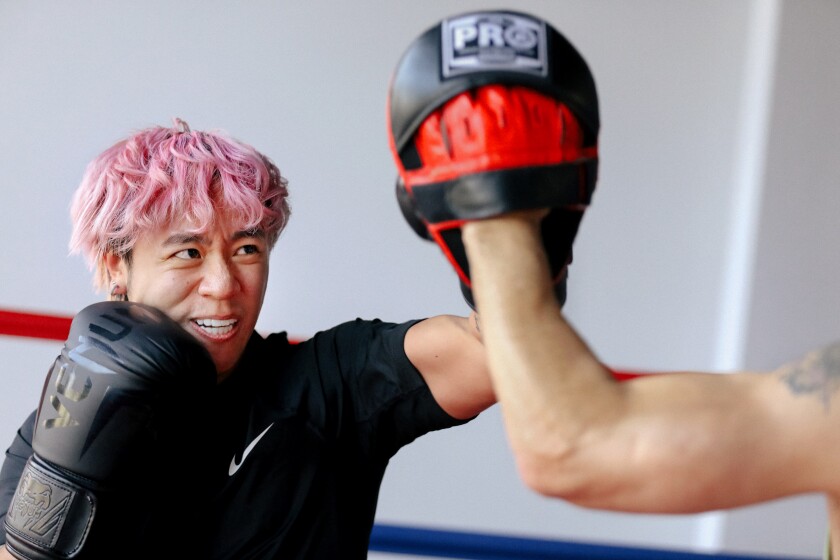On a recent Friday afternoon, Le donned boxing gloves and practiced punches at a Studio City gym. Sparring with his coach Ricky “Showtime” Quiles, the pink-haired influencer worked on his jabs and uppercuts beside a backdrop photo of Sugar Ray Robinson and other boxing champions.
Le delivered 12 uppercut punches, swinging his right fist into Quiles’ boxing glove.
“Like that, like that,” Quiles said, a four-time championship prize fighter and boxing trainer “The goal is to have it in your muscle memory,” Le said. “It’s like once you enter the ring, you forget a lot of it. A lot of it gets thrown out the window.”
Le, who had no prior boxing experience before committing to his first match, is no stranger to learning footwork and combinations.
He fell in love with dance after taking a class at 12 years old, and propelled it into a career as an instructor in his hometown of West Palm Beach, Fla. Then, in 2015, he decided to build up his social media profile.
Le trains with Ricky Quiles, 51, owner, at Ricky’s Boxing Gym for Le’s second boxing match.
(Gary Coronado / Los Angeles Times)
“I told myself, ‘OK, it’s not a matter of how, it’s a matter of when’ … and ‘I know I can do it,’” Le said.
Popular Asian American comedic video creators like Ryan Higa and Kevin Wu inspired him, showing a different way to make a living, said Le, who is Vietnamese American.
“I’ve always personally been very entrepreneurial-minded, and never really felt like I wanted to do a 9 to 5 for the rest of my life,” Le said.
Out of his family’s garage, Le uploaded dance tutorials on social media, like how to do the Nae Nae, a hip-hop dance move, in reverse. His popularity skyrocketed after he ramped up his video content on burgeoning social media app TikTok in 2019.
Le’s clip of him dancing inside his local Walmart store stood out in a sea of lip-synching videos and went viral. His followers grew from 600,000 to 1 million in just one week.
“That was just unheard of,” Le said. “So I was just super stoked and I just kind of like fell in love with the app and just kept going.”
Le, whose social media username is “justmaiko” (which he says is “just an Asian way of spelling Michael”), eventually amassed 51.5 million followers on TikTok, with videos capturing pranks, smooth dance moves, his life and interests.
He became a full-time video creator, and in 2020, moved his family from West Palm Beach to Los Angeles. His sister Tiffany and mom Tina both featured on Le’s videos, also have gained millions of social media followers.
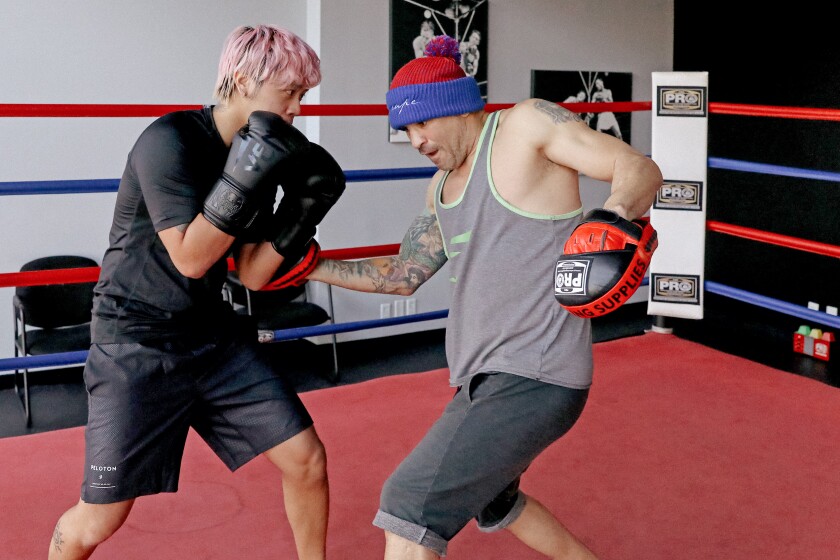
(Gary Coronado / Los Angeles Times)
As Le’s fanbase grew, so did his income. Last year, he says he made more than $3 million, primarily by promoting brands such as streaming service Disney+, clothing sold on Amazon and teeth straightener Invisalign. He recently made his first film appearance, a cameo in the blockbuster “Spider-Man: No Way Home,” and is represented by major talent agency WME.
Forbes ranked Le as the sixth highest-earning TikTok star in 2020. He’s the 14th most popular video creator on TikTok based on number of followers, according to analytics firm Social Blade.
But Le knows there is no guarantee those fans will stay with him or if the platforms where he uploads his videos will continue to exist or alter their business practices.
Which is why boxing deals can be so attractive, generating potentially hundreds of thousands of dollars for each participant. YouTuber Jake Paul has a multi-fight deal with Showtime Sports. Forbes estimated Paul made $40 million from his three boxing wins last year.
So last year when YouTuber Austin McBroom came to Le’s home explaining his vision for “Social Gloves” — an amateur boxing match that would pit popular TikTok stars against their YouTube rivals — Le quickly signed up.
“I was really looking for something to boost my brand and get my name out there even more,” Le said. “With my social media … I’ve always wanted to break the barrier, the boundaries of what I can and can’t do, and I saw this was a cool opportunity to be like, ‘Oh cool, you can do other things as well.’”
Le, with no prior experience in boxing, found his trainer a month and a half before the tournament. That didn’t leave much time for Quiles to shape him into a boxing champion.
“He was like a blank piece of paper,” Quiles said. “I’m like Michelangelo, and we both started creating our work together. So I started from scratch with him and taught him good boxing technique.”
By that, Quiles, a 51-year-old former professional boxer, means teaching Le how to do “slick s—.”
“Make a mess. Make them pay,” Quiles said. “Defense. Offense. All the jabbing, moving your head, being really slick.”
Le said over the course of his training, he lost 10 pounds and gained that back in muscle. He boxed in the morning for an hour, ran two miles during the day and at night worked out for another three or four hours. He consumed 150 to 180 grams of protein a day.
“It was like rinse, repeat, basically,” Le said.
Quiles, who has worked with celebrities like actor David Arquette, said he previously had no idea who Le was or the magnitude of his fame.
“At first I was like, this is kind of weird,” said Quiles, of the influencer boxing trend. “But you know, anything that’s positive out there, if they train hard and have deep respect to the sport, which they do, especially after a fight … I think it’s pretty cool.”
And humbling.
When the Social Gloves tournament launched in June, Le was considered the underdog. His opponent, Khattri, weighed in 5.6 pounds more than the 145.6-pound Le. But Le had more social clout — at the time he had 48.6 million TikTok followers compared with Jarvis’ 4.57 million YouTube subscribers.
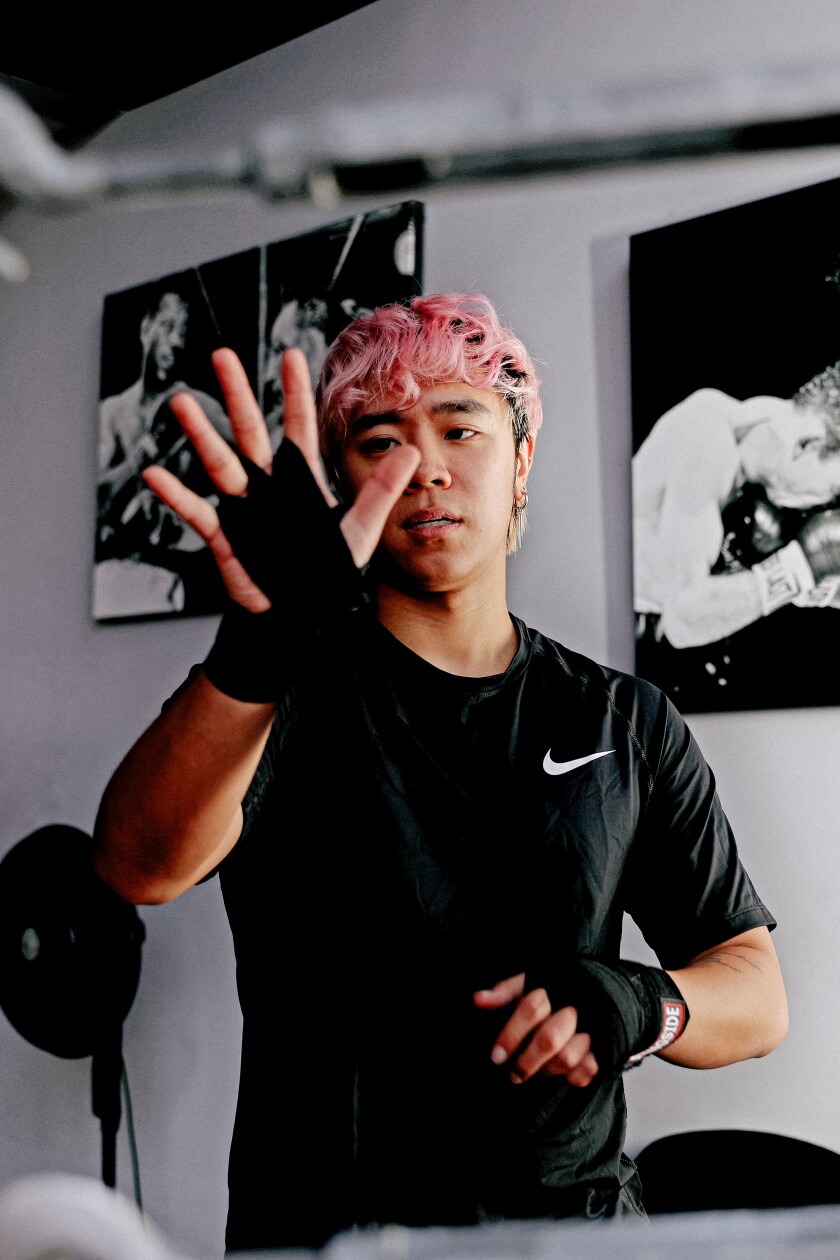
(Gary Coronado / Los Angeles Times)
“I felt like I was going to be ready for it because I’ve done professional dancing so being onstage and performing for an audience isn’t something that is new to me … but once I was at the ring, it was completely different,” Le said. “Your endurance is completely like wiped away just because of all the adrenaline is pumping because of the audience.”
Le’s knockout, along with other scenes from Social Gloves, went viral. LiveOne said Social Gloves collected more than 3.5 billion impressions across social media, the press and event platforms.
“Influence is what fame means today,” said Kyle Hjelmeseth, president of G&B, a firm that manages digital talent, in an email. “People will tune into a ‘typical’ celeb athletes vs. influencer boxing fight because the power of social media drives our economy, develops trends, drives retail sales, and now, as you are seeing, drives sports.”
But last summer’s sporting spectacle also gained notoriety over accusations that Social Gloves failed to pay some of the fighters.
Le said in a court filing that Palmdale-based Simply Greatness Productions (SGP), which is associated with YouTuber Austin McBroom, reneged on a commitment to pay him $400,000, and instead only paid him a $25,000 signing bonus.
LiveOne also sued SGP, saying the event wasn’t properly marketed. SGP countered that LiveOne withheld financial information. The case was settled.
Attorneys representing Le and SGP declined to comment on the litigation.
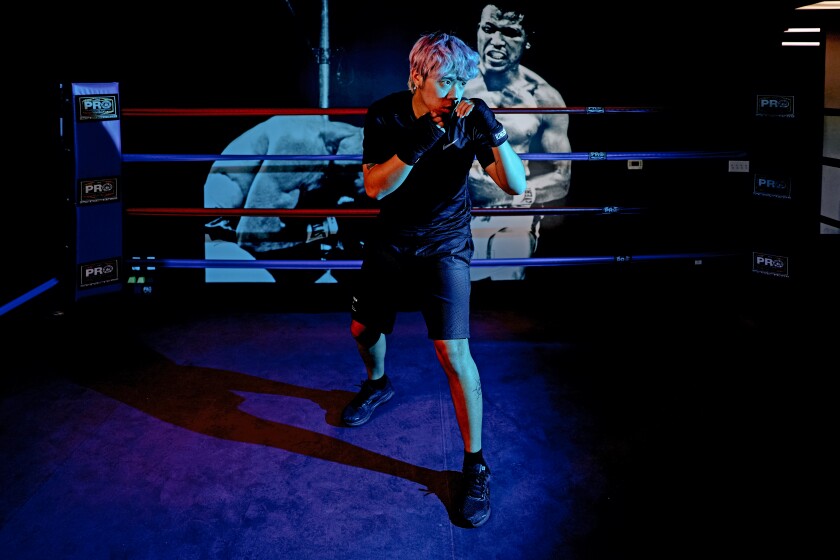
(Gary Coronado / Los Angeles Times)
Despite the legal fight with Social Gloves — and losing to Khattri — Le hasn’t thrown in the towel yet.
There was an upside to his loss: Since that match, he’s already picked up 2.9 million more followers on TikTok.
At the Studio City gym, after punching through several workout sets to improve his agility and stamina, Le leaned against the sides of the ring, saying he was tired and sore. Then, he got back up.
“My boxing story isn’t finished yet,” he said.
His punching gloves compete with his many other projects, such as promoting NFTs or non-fungible tokens, another trend TikTok creators have embraced.
“Boxing has opened my eyes to a brand new sport that is super dope that I have a new appreciation for,” he said. “This is definitely not going to be the last time people see me breaking out of my box and my bubble.”
Times researcher Scott Wilson contributed to this report.
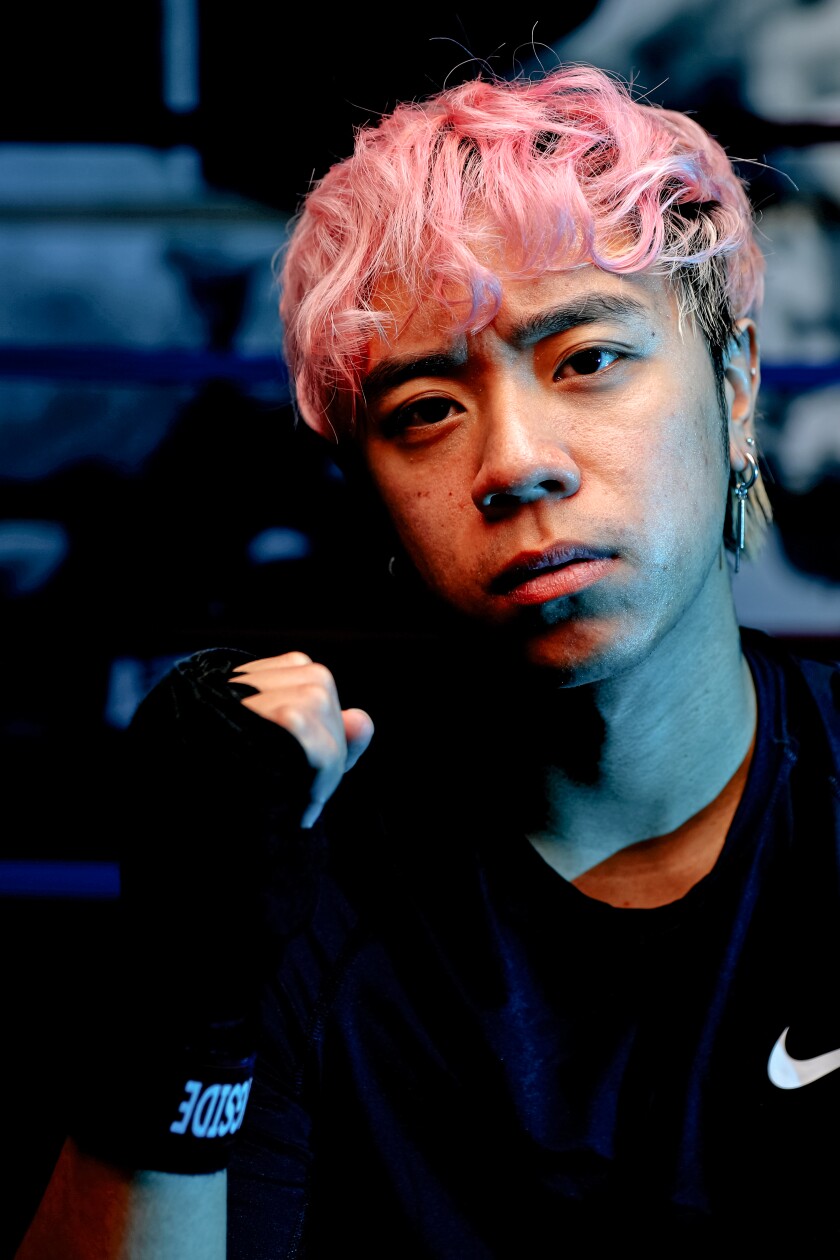
(Gary Coronado / Los Angeles Times)

